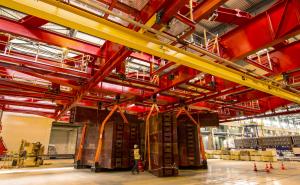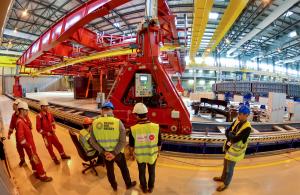Coil winding facility
Gantry crane passes load tests
26 Feb 2018
However complex the science or sophisticated the technology at ITER, there is one simple activity that conditions future success—the ability to lift and manoeuvre exceptionally heavy loads during the project assembly phase.
A 540-tonne load, representing 125 percent of the crane's nominal lifting capacity, is attached to the beams for static tests. Dynamic operations followed at 110 percent in order to monitor the deformation of the beams.
With a nominal lifting capacity of 1,500 tonnes, the undisputed champion of ITER weightlifters is the double overhead crane in the Assembly Hall. Second on the podium is the gantry crane in the Poloidal Field Coils Winding Facility—a 30-metre-in-diameter steel structure supported by four hydraulic towers traveling on rails, capable of lifting the heaviest components of the ring-shaped coils throughout the last stages of fabrication.
Personnel from the European Domestic Agency and from crane manufacturer Ale Heavy Lift are overseeing the load tests. Europe is responsible for procuring 5 out of the 6 poloidal field coils required for ITER operation.
Load tests for the gantry crane began on 16 February with static operations at 125 percent of its nominal lifting capacity of 400 tonnes. Dynamic operations followed at 110 percent in order to monitor the deformation of the beams. With a deflection of less than 119 millimetres, the tests were conclusive.
The bright red gantry crane was tested in three operational lifting configurations corresponding to poloidal field coils #2 and #5 (up to 342 tonnes, Ø 17 metres), poloidal field coils #3 and #4 (up to 385 tonnes, Ø 24 metres), and finally poloidal field coil #6 (396 tonnes, Ø 8.5 metres)¹.
¹ Poloidal field coil #6 (PF6) is being manufactured in China under a European contract but will be cold tested in the on-site poloidal field coil facility.



